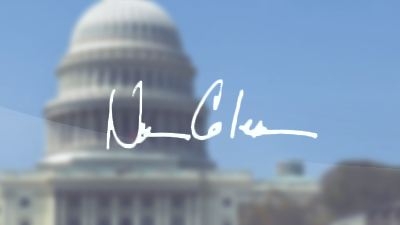Note From Norm: Calling A Capital A Capital
For twenty-two years U.S. Presidents have consistently chosen to waive the Jerusalem Embassy act that was passed, overwhelmingly, by Congress in 1995.
The act, quite simply, required that the United States move its Embassy to Jerusalem and officially recognize Jerusalem as the capital of Israel.
President Donald Trump has finally put an end to the cycle of denial by announcing he intends to move the U.S. Embassy from Tel Aviv to Jerusalem.
“I have determined that it is time to officially recognize Jerusalem as the capital of Israel,” said the President. “This is nothing more or less than a recognition of reality. It is also the right thing to do. It’s something that has to be done.”
The President has lived up to a campaign promise and made it clear that the realities on the ground in the Middle East must dictate our policy in the region, not the need to be politically correct.
The President, and those within his Administration, have underscored that this move doesn’t deter the United States from its commitment to a Middle East Peace process, and emphasize it may well strengthen the opportunity to achieve peace in the region.
Secretary of State Rex Tillerson made this point clear in the following statement:
“The president is very committed to the Middle East peace process. We continue to believe there is a very good opportunity for peace to be achieved, and the president has a team that is devoted to that entirely.”
Critics of the President’s decision, and they are numerous, here, at home, and abroad, are publicly declaring that his actions will lead to greater turmoil and conflict in the Middle East.
With all due respect to those critics I have this to say: Twenty-two years of not stating the obvious has not lessened the turmoil and conflict in the Middle East.
The President simply declared, for the first time in twenty-two years, what has long been accepted U.S. policy.
Perhaps doing something different than what has been done the past twenty-two years may change the dynamics of the peace process.
It certainly can’t hurt.
In the interest of trying to put the President’s decision in perspective I would like to contrast the reaction to this announcement to the one President Obama made regarding Cuba and Iran.
In December of 2014, despite decades of murder, torture, repression and oppression by the Cuban government, President Obama brushed aside decades of U.S. policy towards Cuba and announced he would normalize relations with the country.
Two years later he travelled to Cuba to meet with the Castro Regime and to bask in the glow of his ill-advised policy.
Unsurprisingly, this past August it was revealed that at least two dozen U.S. Embassy officials in Cuba had developed serious hearing loss due to some type of attack.
This week we now know that a number of those same officials have been found to have some form of a brain abnormality.
With Iran President Obama made an even worse bargain with the Devil.
Ignoring decades of concerns, proven evidence of fomenting terrorism and discord in the Middle East, and a publicly stated goal of wiping Israel from the face of the Earth, President Obama agreed to a nuclear deal that will all but assure Iran’s access to nuclear weapons in the future.
In both instances the President was widely applauded by the nation’s media, and many of the same nations that now condemn our current President for his bold decision to publicly acknowledge what has been U.S. policy for years: Jerusalem is the Capital of Israel.
It proves further than when we opt for political correctness to be the leading edge of our nation’s foreign policy we simply undermine our nation’s values, goals and objectives in the long run.
President Trump’s decision was, and is, the right one.
It removes from the Middle East Peace process bargaining table any confusion about U.S. policy regarding the location of our nation’s Embassy.
President Trump is right when he says that “old challenges require new approaches”.
Unlike the feckless approach of appeasement with dictators and brutal regimes advocated by his predecessor, President Trump has made it clear to one of our strongest allies, and the world, that we are committed to peace.
More importantly, we are committed to a process that seeks a lasting peace, rooted in honesty and transparency about U.S. foreign policy and not in decades old decisions to kick the can of political correctness down the road.


